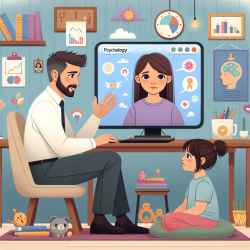The journey from childhood to adulthood is a critical period that shapes an individual's mental health and overall well-being. For gay and bisexual men in Taiwan, the experience of homophobic bullying during childhood can have profound effects on their mental health in emerging adulthood. This blog post explores the findings from a recent study on this topic and offers insights into how practitioners can use this information to improve their support for LGBTQ youths.
The Study at a Glance
The research titled "Effects of traditional and cyber homophobic bullying in childhood on depression, anxiety, and physical pain in emerging adulthood and the moderating effects of social support among gay and bisexual men in Taiwan" provides valuable insights into the long-term impacts of bullying. Conducted by Wang et al., the study involved 500 gay or bisexual men aged 20-25 years who were assessed for their experiences with traditional and cyberbullying during childhood.
Key Findings
- Victims of any type of homophobic bullying in childhood exhibited higher levels of depression, anxiety, and physical pain in emerging adulthood compared to non-victims.
- Those who experienced both traditional and cyberbullying showed more severe anxiety than those who faced only one form.
- Family support played a crucial role in moderating the effects of bullying on anxiety and physical pain but not on depression.
Implications for Practitioners
The findings highlight the importance of early intervention and prevention strategies targeting homophobic bullying. Here are some practical steps practitioners can take:
1. Enhance Family Support
The study underscores the protective role of family support against the adverse effects of bullying. Practitioners should work towards involving families in therapy sessions and provide them with resources to better support their LGBTQ children. Encouraging open communication within families can help create a more accepting environment that buffers against mental health issues.
2. Address Both Traditional and Cyberbullying
Given that victims of both forms of bullying experience more severe anxiety, it is crucial for practitioners to address both traditional and cyberbullying in their interventions. This can involve educating students about the impact of online harassment and implementing school-wide policies that discourage all forms of bullying.
3. Focus on Anxiety as a Key Indicator
Anxiety emerged as a significant issue among those who experienced multiple forms of bullying. Practitioners should prioritize routine screenings for anxiety symptoms in LGBTQ youths who have been bullied. Early identification can lead to timely interventions that prevent further escalation into more severe mental health problems.
Encouraging Further Research
This study opens up several avenues for further research. Understanding the specific mechanisms through which family support mitigates anxiety and physical pain could provide deeper insights into effective intervention strategies. Additionally, exploring peer support dynamics could reveal new ways to foster supportive environments within schools.
Practitioners are encouraged to delve deeper into these findings by accessing the original research paper: Effects of traditional and cyber homophobic bullying in childhood on depression, anxiety, and physical pain in emerging adulthood and the moderating effects of social support among gay and bisexual men in Taiwan.
Conclusion
The impact of homophobic bullying extends far beyond childhood, affecting mental health well into adulthood. By enhancing family support systems, addressing both traditional and cyberbullying, and focusing on anxiety as a key indicator, practitioners can play a vital role in supporting LGBTQ youths through these challenges.










